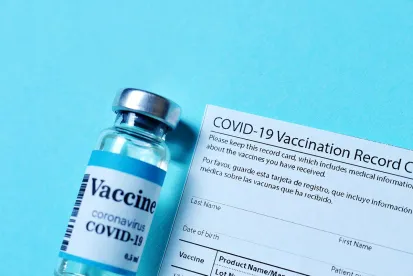The EEOC stated that employers can now order their employees to receive the COVID-19 vaccination shot, provided that they comply with the reasonable accommodation provisions of the American with Disabilities Act (ADA), religious exceptions, and other laws.
The justification for allowing employers to mandate vaccinations is based upon the logical and strong premise that unvaccinated employees present a “direct threat” to others in the workplace. It is likely the Occupational Safety and Health Administration (OSHA) will promulgate COVID-19, related health and safety rules that employers are required to adhere too. Currently, OSHA is relying on the Center for Disease Control and Prevention (CDC) for guidance pertaining to vaccinated and unvaccinated employees. I believe OSHA will weigh in shortly, and I recommend that employers bookmark OSHA’s website and check it fairly often for additional guidance. I also recommend regularly checking with your state and local government for additional updates.
Before requiring your employees be vaccinated, you should be aware that an “employee who does not get vaccinated due to a disability (covered by the ADA), or a sincerely held religious belief, practice, or observance (covered by Title VII) may be entitled to a reasonable accommodation that does not pose an undue hardship on the operation of the employer’s business.” The EEOC recommended the following “reasonable accommodations” for employees who cannot get vaccinated: masking, working at a social distance from coworkers or non-employees, working modified shifts, getting periodic tests for COVID-19, teleworking, or reassigning the employee.
Employees cannot cite their societal, political, economic philosophies, as well as personal preferences as a reason not to get vaccinated if their employer mandates vaccinations.
Employers must also consider state and local employment laws which may not permit vaccination mandates. New Jersey, New York, Pennsylvania and other states have state anti-discrimination laws. Typically, state-based anti-discrimination laws were enacted to supplement federal laws. While, I believe some, if not most states will follow the EEOC (allowing employers to mandate vaccinations), it is extremely likely that some states will not follow suit. This is why I am recommending that most employers consider educational programs and non-coercive incentives over vaccination mandates.
Employers may offer incentives to their employees who receive COVID-19 vaccines and voluntarily documentation of the same, but under certain circumstances. Any “incentive (which includes both rewards and penalties) may not be so substantial as to be coercive.” Employers are required to keep vaccination information confidential pursuant to the ADA.
Finally, employers may provide employees and their family members with information to educate them about the benefits of getting vaccinated and to address common questions and concerns. Check with your company’s health insurance provider, it may offer resources that will provide accurate, and helpful information to your employees.



 />i
/>i

